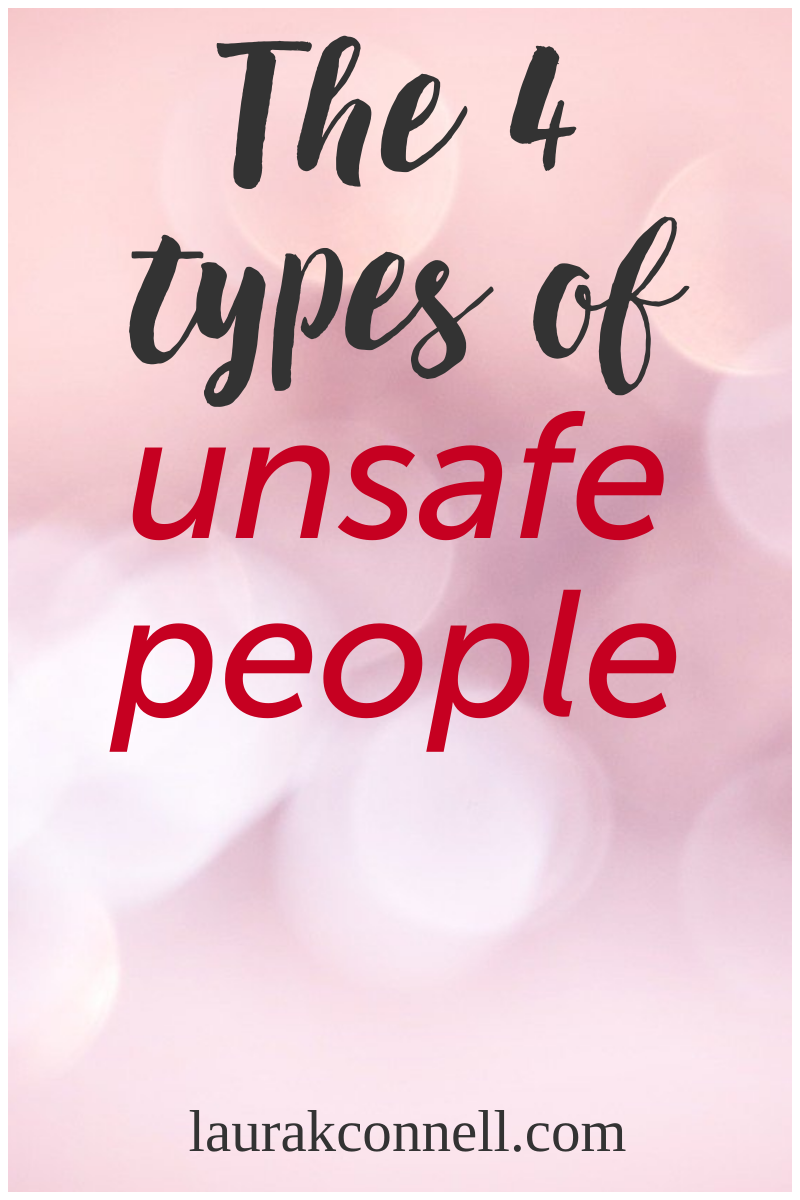Unsafe people: 4 signs someone is unsafe and how to avoid the pain
Unsafe people haven't done the work of dealing with their internal issues. They express their poor mental health in ways that can harm the people in relationship with them.
The more time you spend with these people, the more they reveal their negative character. Nobody's perfect, but these types can really hold you back and make you question yourself.
4 signs of unsafe people
It's important to know what to look for so you can spot the red flags early. Here are four major signs someone is unsafe and how to avoid getting involved with them.
1. They can't tolerate vulnerability.
Unsafe people pretend they have it all together. The act can be so convincing, even to themselves, you believe they really don't have any problems.
Their image and reputation are really important to them. Certainly, more important than connecting with you or sharing a real relationship.
When you show vulnerability or share your struggles, they’ll shut down or change the subject because they can't handle this level of openness.
They might even attack or pull away from you if you display this desire for connection. They make you the bad guy for wanting to share your struggles, which they portray as weak or shameful.
These people are relentlessly positive and tell you not to dwell on your problems. Or quote Bible verses to you instead of listening.
This is extremely painful and confusing. It makes you believe there's something wrong with you because you're not perfect.
2. Unsafe people are selfish.
It’s all about them and their needs. When you bring up a problem, they immediately relate it to something in their own life.
Suddenly, the conversation is all about them and you're wondering what happened.
These types of unsafe people are poor listeners. They are not interested in supporting you or discovering your needs.
Sometimes they are bottomless pits and no matter how much you give to them it’s never enough.
Selfish people can also be controlling because they don't know where they end and you begin. As far as they're concerned, everyone exists to serve their needs.
3. They are critical.
Critical people don't give constructive criticism or helpful feedback. However they express it, they say you're not good enough and never will be.
They have a mysterious standard you can't live up to. They let you know you’re constantly disappointing them by falling short of that standard.
Critical people look down on you, act superior to you, and chip away at your self-esteem with their constant complaints.
4. Unsafe people demand trust before it's earned.
An example of this type is someone in a marriage who's had an affair. This person gets angry if you don’t let things go right away.
They don't believe they should have to make any changes in their behavior to help win your trust back. They think an apology should be enough.
Another example is a spouse who betrays you financially and then balks at having his credit card activity monitored.
He thinks you should trust him even though he's done nothing to earn it.
Trust has to develop over time even if someone has never betrayed you. You can still love someone before you decide whether to trust them.
How to avoid the pain of unsafe people
Take time to get to know the whole person.
The deeper you go in a relationship the more you discover about the person. This is why some suggest waiting at least a year before marrying someone.
Anyone can appear squeaky clean on a first date or a job interview. That’s why companies have probationary periods. Unsafe people reveal themselves over time.
Don't get too caught up in external qualities.
We're attracted to people’s surface qualities initially. These include their looks, sense of humor, charm, charisma, talent, and achievements.
That's natural, but over time what sustains a good relationship is the internal qualities. These include a loving heart, a fair mind, an honest soul, and so on.
A person of integrity is someone whose outside matches their inside. They're not one person at the beginning of the relationship and another once you get to know them.
Check their patterns...and yours.
Dr. Phil said the best predictor of future behavior is past behavior. Find out about this person's previous relationships. How did they end?
Does chaos seem to follow them around? Do they refuse to take responsibility and it's always someone else's fault?
Now look at yourself. Can you think of someone in your life who embodies one of the categories? Have you dealt with people like this more than once in relationships?
If it happened once and you learned from the experience, that's healthy. However, if you get into relationships with these people repeatedly, something's wrong.
You're ignoring or refusing to look at the warning signs. Or maybe you're getting into relationships too quickly. You're not setting appropriate boundaries to protect yourself.
This is not an exhaustive list of categories of unsafe people. You might think of more you've encountered, like people who are irresponsible and expect you to take care of them.
Most of the research from this post came from a talk by John Townsend who wrote the book Safe People with co-author Henry Cloud.



